Livestock Fencing For Horse, Goat, Hog, Cattle
Livestock fencing plays a vital role in animal husbandry. It is not only a barrier to protect livestock and prevent theft but also helps manage pastures, improve land utilization, and promote livestock growth. Used as horse panels, gate panels, cattle corral panels, cow panels, goat and sheep panels, hog fence, farm fence gate, etc. Wanzhi Steel stocks a large number of conventional-sized livestock fences, including 8-22Ga wire diameters, customizable height and length, and galvanized wire and stainless steel wire materials. You are welcome to contact us.

horse wire fence
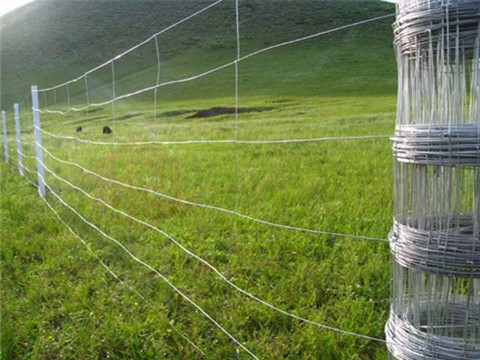
Galvanized Fencing

grassland field sheep fence
Livestock Fencing Specification
| Item | Livestock Fencing |
| Place of Origin | Hebei, China |
| MOQ | 200 Rolls/pieces |
| Material | Galvanized wire, PVC coated wire, q195/q235 low carbon steel wire, SS wire |
| Surface treatment | PVC-coated or hot dip galvanized |
| Color | Blue, white, green, as customers’ requirement |
| Feature | Anti-climb, protects against cut-through |
| Wire Diameter | 1.8mm 2mm 2.5mm 3mm |
| Panel hight | 0.5-4 m and so on |
| Panel length | 50 m-100 m |
| Roll length | 15m 30m 50m 100m |
| Packing | Rolls with waterproof paper and woven cloth |
| Transportation | By sea, by land |
| Delivery time | 15-18 days |
| Price Term | Ex-work, FOB, CIF, CFR, etc |
| Payment | T/T 30% Deposit |
Square tube fence post specification
|
Square tube style
|
||
|
Height*Length
|
1m*2.1m,1m*2.9m,1.8m*2.1m
|
|
|
horizontal rails
|
40*40mm,50*50mm (6 square rail)
|
|
|
vertical pipe
|
40*40mm,50*50mm
|
|
|
Thickness
|
1.6mm, 2.0mm
|
|
|
material
|
pre hot dipped galvanized steel pipe
|
|
|
Accessories
|
2 U lugs, 2 L lugs, 2 rain caps, and 2 bases are welded on panel2 pins are included in 1 panel
|
|
Key Features of Livestock Fencing
1. Protect livestock safety: prevent wild animals from approaching, and at the same time, prevent livestock from escaping.
2. Prevent theft: solid fences can prevent livestock from being stolen and protect the property safety of livestock farmers.
3. Effectively manage pastures: by dividing different areas with fences, the pasture can be managed in a refined manner.
4. Improve land utilization efficiency: maximize the use of land resources and achieve balanced development of pasture and livestock.
5. Promote the healthy growth of livestock: livestock within the fence are not disturbed by the outside world, and a quiet and stable environment is more conducive to growth.
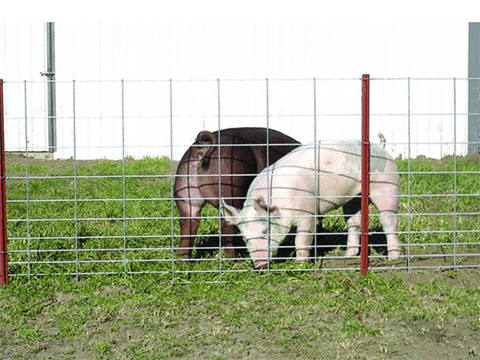
Galvanized Hog Panels
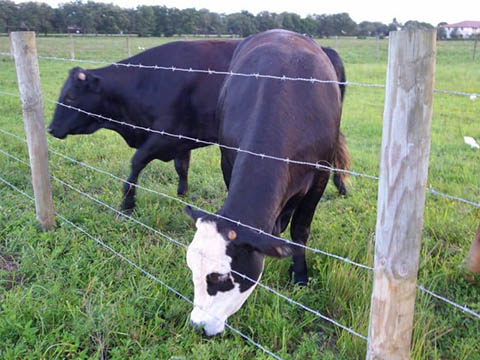
Barbed Wire Cattle Fence
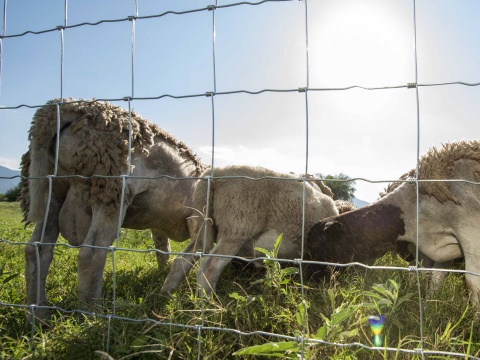
Hinged Sheep Pasture Fence
Recommended sizes for different livestock
| Animal Type | Recommended Gauge | Height | Mesh Size |
| Cattle | 12.5-14 ga | 51-55″ | 6″×6″ (woven,25mm x 25mm) |
| Sheep/Goats | 14-16 ga | 47-51″ | 4″×4″, or 120mm x 120mm |
| Pigs | 14 ga (woven) | 36-48″ | 2″×4″ |
| Poultry | 16-19 ga (welded) | 24-48″ | 1″×1″ |
| Horses | 12.5-14 ga (smooth) | 54-60″ | 6″×6″ (woven,25mm x 25mm) |
| Rabbits | 16ga | 14-25″,105cm | 1″×1″ |
| Dog | 14g | 30-50″ | 50mm x 50mm |
| Chickens | 22g | 1.5m | 50mm x 50mm |
| Fox | 14g,2mm | 1.8m | 50mm x 50mm |
| Badger | 12.5mm | 1.3m | 50mm x 50mm |
NOTE: Thicker wire (lower gauge) = stronger, more expensive. Height depends on animal size: e.g., goats need 47″+ to prevent jumping.
Wanzhi Steel Livestock Fencing Case

189 tons of cattle wire fence
Types of Livestock fencing
1. Classification by usage time
① Permanent fence
Suitable for long-term use of pastures, usually built with solid building materials (such as wood, metal, concrete, etc.), with high stability and durability.
It is suitable for short-term use or pastures that require frequent changes, such as seasonal grazing areas. This type of fence is usually constructed of lightweight, easily removable materials (such as plastic mesh, wire mesh, etc.), making it easy to move and rearrange.
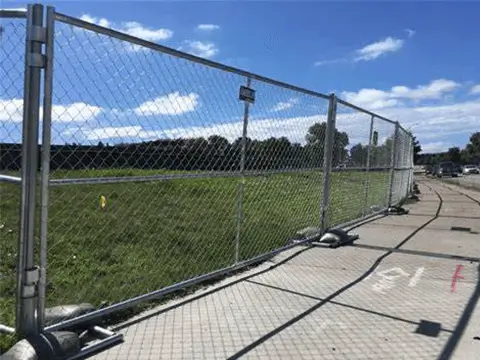
Temporary Goat Fence Panels
2. Classification by process
① Woven Wire Fence (Field Fence)
Best for: Cattle, Sheep, Goats, Deer
Mesh Pattern: Fixed Knot, Heavy Duty, 2.5-14 Gauge. Hinged Knot is more flexible, and 14-16 Gauge wire is recommended.
Common Heights: 47 inches, 51 inches, 55 inches
Advantages: Prevents animals from getting trapped, long service life (20+ years)
② Barbed Wire Fence
Best for: Large pastures, usually made of 4-6 strands of wire.
Wire gauge: 12.5-14 gauge (high tensile strength)
Features: Low-cost deterrent, but there is a risk of harming animals
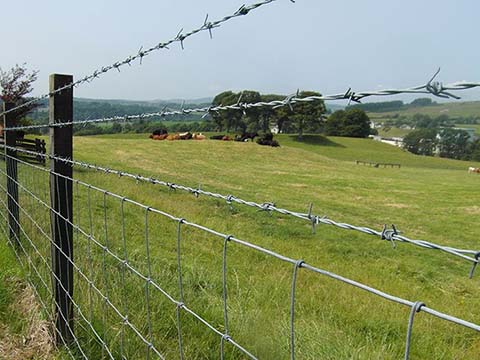
Barbed Wire Farm Fence
③ Electric fence
Polywire (temporary grazing)
High-strength steel wire: permanent, 12.5-14 gauge
Voltage: 2,000-10,000V (for livestock)
Advantages: Adjustable boundaries, low maintenance costs
④ Welded wire fence
Best suited for: poultry, pigs, small animals
Grid size: 1″×1″, 2″×4″, 14-16 gauge is commonly used for wire.
Height: 24″, 36″, 48″.
Advantages: Predator-proof, easy to install
⑤ Panel fence (feedlot panel)
Best suited for: temporary fences, stables, use galvanized steel sheet (6-8 gauge frame), galvanized steel as material.
Size: 16 feet long × 50-60 inches high, customizable
Advantages: ultra-durable, no sagging
Livestock Fencing Application
Also known as cattle fence or hog panel fence, is a rectangular solid grille, which is made of thick metal wire welded together and galvanized, and the mesh size can be different.
2. Cattle panel
Can be made of woven wire, barbed wire fence, or galvanized grille. Modern popular cattle fences are also used in DIY Garden Trellis, and they generally have bull panel fences, cow fence panels, deck railing cattle panels, and other types. 16ft cattle panel is a common size.
3. Goat Fence & Sheep Fence
Refers to the woven fence used to isolate and protect goats, sheep, cattle, pigs, and horses. Since sheep are good at jumping, we should pay special attention to the height and mesh size of the goat fence. For example, the no climb goat fence uses a small hole welded mesh.
4. Horse Fence
Horse Rail (also called “plank” or “board”) fences are popular on horse farms because they are attractive, highly visible, and relatively safe. Specifically, we suggest fencing heights of: 1.08 m – 1.38 m (3.6 ft – 4.6 ft) Ponies: 1 m – 1.3 m (3.3 ft – 4.3 ft).
5. Dog fence
Closer to a pet fence, you can DIY a dog cage or dog gate for outdoor use. Usually, it is a fence woven from welded grilles or chain link mesh.
6. Farm Fence
Also called farm gates, cattle gates, no climb horse fences, Agricultural fencing, livestock gates, or sheep wire fencing, it is also made of woven wire mesh, and the weaving styles are generally the following two. Wanzhi Steel supports customized mesh sizes, shape, height, and length.
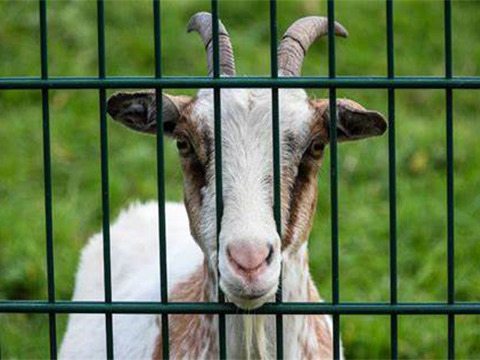
no climb goat fence

bull panel fence
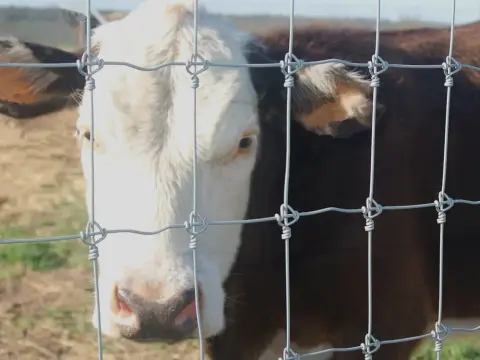
Prairie Cattle Fence
Different types of prices
| Fence Type | Price per Foot | Price per Roll (330 ft) |
| Woven Wire (14 ga) | 0.25−0.25−0.50 | 80−80−160 |
| Barbed Wire (12.5 ga) | 0.10−0.10−0.20 | 35−35−65 |
| Electric Polywire | 0.05−0.05−0.15 | 15−15−50 |
| Welded Wire (16 ga) | 0.30−0.30−0.70 | 100−100−230 |
| High-Tensile (12.5 ga) | 0.15−0.15−0.30 | 50−50−100 |
| Feedlot Panels | 25−25−50 per panel | N/A |
Factors that affect cost
Coating (galvanized or PVC coated), wire gauge (thicker = more expensive), and mesh size (smaller openings cost more).
How to choose the right fence?
① Type of livestock – Determines wire diameter
Cattle: Braided or barbed wire.
Sheep/goats: Small mesh (4″×4″).
Horses: Smooth or electric wire.
② Climate and terrain
Rain and snow areas: Avoid low-tension wire.
Rocky soil: Use flexible hinge joint fence.
③ Budget and lifespan – Determine the material
Cheapest: Barbed wire ($0.10/ft).
Most durable: High-strength smooth wire (30+ year lifespan).
④ Predator threat – Determine height and mesh type
Coyotes/wolves: 6-foot high braided wire + barbed Wire.
Raccoons: 1″×1″ welded wire for poultry.
Key points of livestock fencing construction
1. Reasonable planning and layout: Reasonable planning of fence layout according to the terrain, climate, and grass distribution of the ranch to ensure that livestock can make full use of grass resources and avoid overgrazing.
2. Pay attention to maintenance: Check the condition of the fence regularly and repair the damaged parts in time. At the same time, clean up the weeds and garbage around the fence in time.

Packaging according to client requirements

GI wire mesh in stock for sale
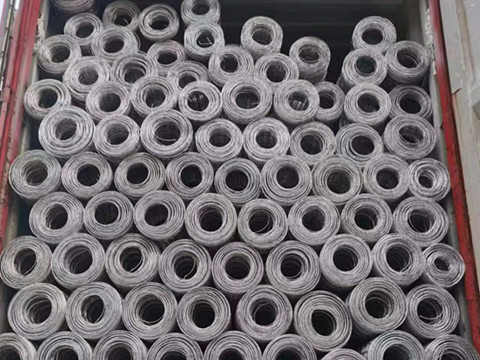
950 Rolls of Field Fence to Vanuatu
FAQ: Livestock fencing
1. Q: What is the lifespan of a livestock fence?
Galvanized steel: 20-30 years, PVC coating: 15-25 years, Electric: 10-15 years (including maintenance).
2. Q: Can I install the fence myself?
Yes, but use corner braces to secure the fence and space the posts 8-12 feet apart, depending on the field.
3. Q: What type of fence is best for goats?
47+ inches high braid wire (4″ x 4″ mesh, 14 ga), topped with barbed wire.
Livestock Fencing Supplier – Wanzhi Steel
Therefore, livestock fencing provides great help in safety and management. Galvanized livestock fencing will provide decades of life, thus saving you a lot of costs. If your budget is sufficient or the environmental requirements are high, the service life of PVC GI wire mesh will be longer than that of GI livestock mesh.
If you have any questions, welcome to contact us via online chat
or send an email to info03@wanzhisteel.com.
Wanzhi Steel is an ISO 9001-certified steel factory located in Hebei, China. It has been specializing in the production of galvanized livestock fence, horse fence, field fence, goat fence, pasture fence, Game Fence, corral panels, and farm fence for 14 years, with a monthly output of 1,800 tons. With high-quality products and good services, its products have been exported to more than 120 countries around the world.
Leave Us A Message










